Ethical Considerations Used in Social Sciences Research Analysis
VerifiedAdded on 2022/12/27
|7
|1667
|24
Essay
AI Summary
This essay delves into the critical role of ethics in social science research, emphasizing its importance in generating valid and reliable outcomes. It highlights two key ethical considerations: informed consent and privacy. Informed consent is presented as a fundamental principle, requiring researchers to obtain voluntary agreement from participants, ensuring they understand the study's purpose and their right to withdraw. The essay stresses the importance of providing complete information and maintaining transparency to minimize the risk of fraud. Privacy is discussed as another crucial element, emphasizing the need to protect participants' personal information and comply with data protection laws. The essay underscores the potential consequences of breaching privacy, such as loss of trust and legal penalties. The conclusion reinforces the necessity of adhering to these ethical guidelines to ensure research integrity and produce authentic findings.
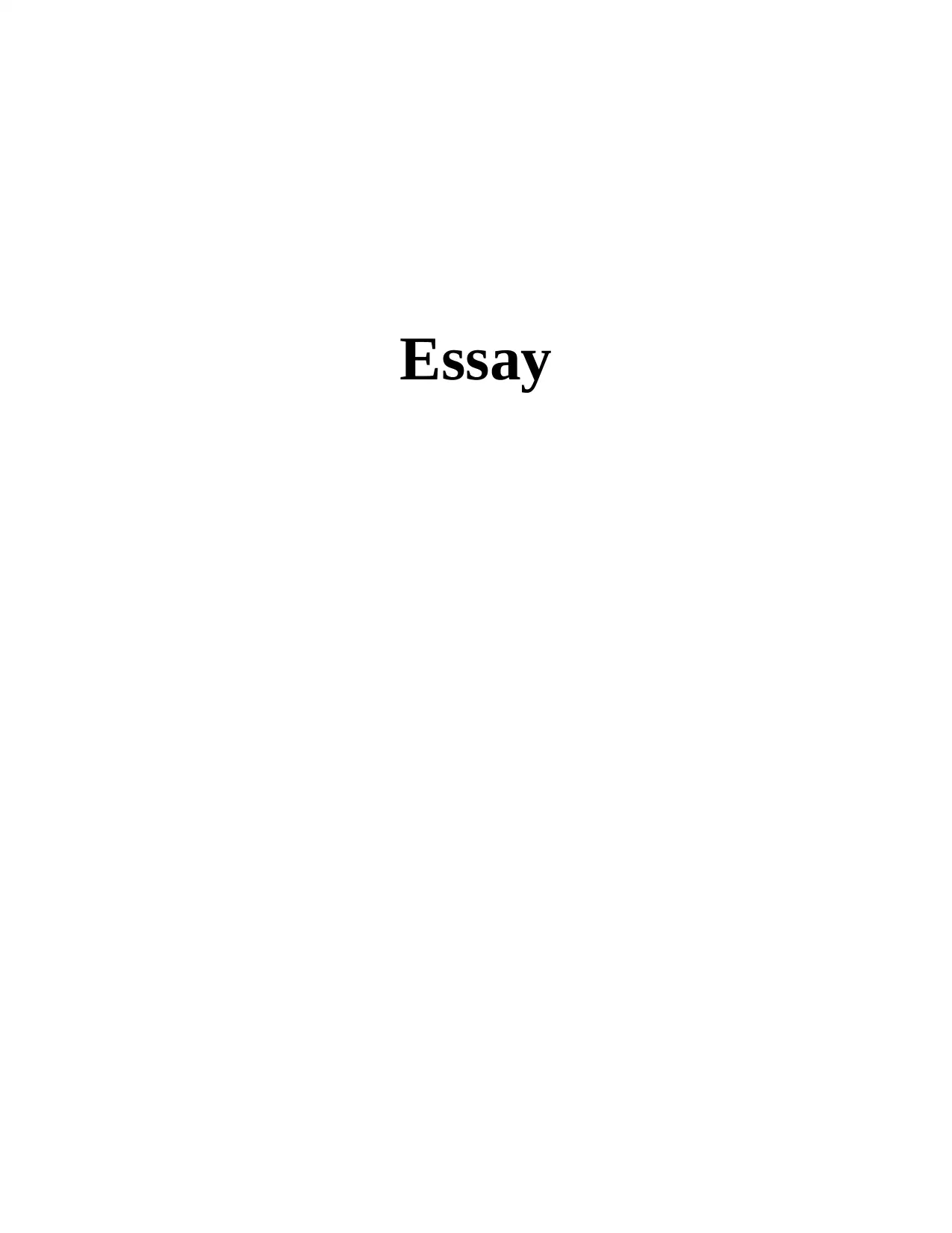
Essay
Paraphrase This Document
Need a fresh take? Get an instant paraphrase of this document with our AI Paraphraser
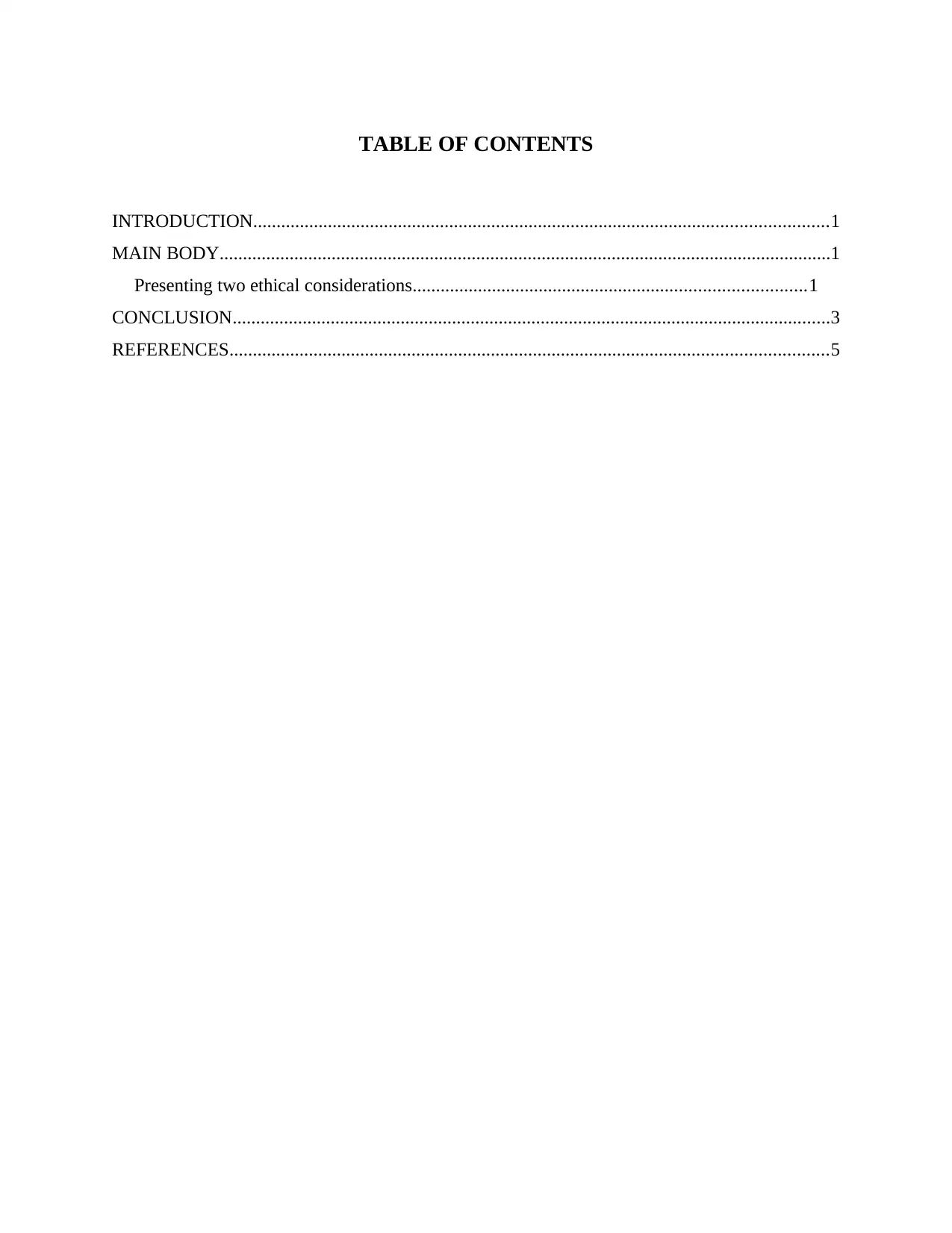
TABLE OF CONTENTS
INTRODUCTION...........................................................................................................................1
MAIN BODY...................................................................................................................................1
Presenting two ethical considerations....................................................................................1
CONCLUSION................................................................................................................................3
REFERENCES................................................................................................................................5
INTRODUCTION...........................................................................................................................1
MAIN BODY...................................................................................................................................1
Presenting two ethical considerations....................................................................................1
CONCLUSION................................................................................................................................3
REFERENCES................................................................................................................................5
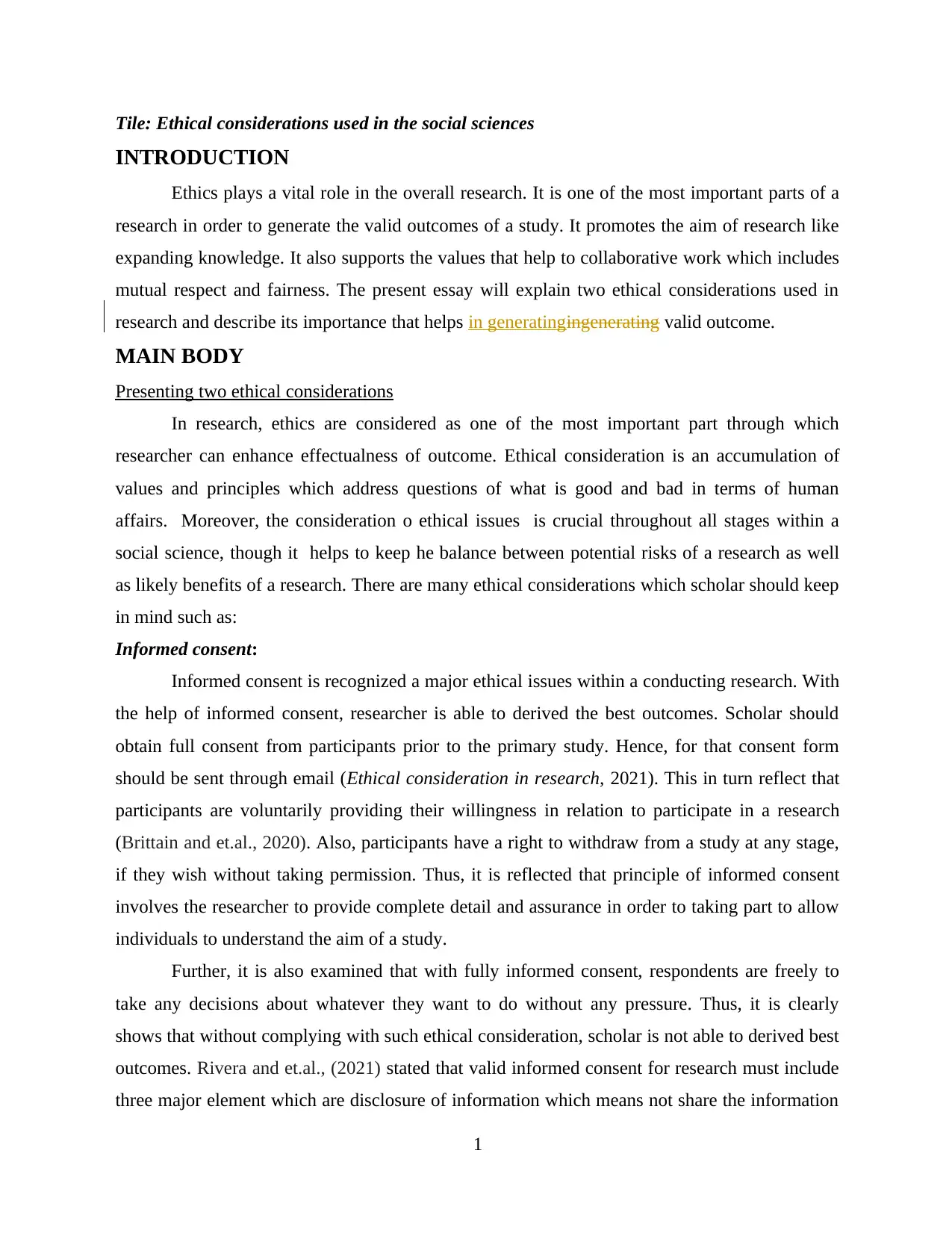
Tile: Ethical considerations used in the social sciences
INTRODUCTION
Ethics plays a vital role in the overall research. It is one of the most important parts of a
research in order to generate the valid outcomes of a study. It promotes the aim of research like
expanding knowledge. It also supports the values that help to collaborative work which includes
mutual respect and fairness. The present essay will explain two ethical considerations used in
research and describe its importance that helps in generatingingenerating valid outcome.
MAIN BODY
Presenting two ethical considerations
In research, ethics are considered as one of the most important part through which
researcher can enhance effectualness of outcome. Ethical consideration is an accumulation of
values and principles which address questions of what is good and bad in terms of human
affairs. Moreover, the consideration o ethical issues is crucial throughout all stages within a
social science, though it helps to keep he balance between potential risks of a research as well
as likely benefits of a research. There are many ethical considerations which scholar should keep
in mind such as:
Informed consent:
Informed consent is recognized a major ethical issues within a conducting research. With
the help of informed consent, researcher is able to derived the best outcomes. Scholar should
obtain full consent from participants prior to the primary study. Hence, for that consent form
should be sent through email (Ethical consideration in research, 2021). This in turn reflect that
participants are voluntarily providing their willingness in relation to participate in a research
(Brittain and et.al., 2020). Also, participants have a right to withdraw from a study at any stage,
if they wish without taking permission. Thus, it is reflected that principle of informed consent
involves the researcher to provide complete detail and assurance in order to taking part to allow
individuals to understand the aim of a study.
Further, it is also examined that with fully informed consent, respondents are freely to
take any decisions about whatever they want to do without any pressure. Thus, it is clearly
shows that without complying with such ethical consideration, scholar is not able to derived best
outcomes. Rivera and et.al., (2021) stated that valid informed consent for research must include
three major element which are disclosure of information which means not share the information
1
INTRODUCTION
Ethics plays a vital role in the overall research. It is one of the most important parts of a
research in order to generate the valid outcomes of a study. It promotes the aim of research like
expanding knowledge. It also supports the values that help to collaborative work which includes
mutual respect and fairness. The present essay will explain two ethical considerations used in
research and describe its importance that helps in generatingingenerating valid outcome.
MAIN BODY
Presenting two ethical considerations
In research, ethics are considered as one of the most important part through which
researcher can enhance effectualness of outcome. Ethical consideration is an accumulation of
values and principles which address questions of what is good and bad in terms of human
affairs. Moreover, the consideration o ethical issues is crucial throughout all stages within a
social science, though it helps to keep he balance between potential risks of a research as well
as likely benefits of a research. There are many ethical considerations which scholar should keep
in mind such as:
Informed consent:
Informed consent is recognized a major ethical issues within a conducting research. With
the help of informed consent, researcher is able to derived the best outcomes. Scholar should
obtain full consent from participants prior to the primary study. Hence, for that consent form
should be sent through email (Ethical consideration in research, 2021). This in turn reflect that
participants are voluntarily providing their willingness in relation to participate in a research
(Brittain and et.al., 2020). Also, participants have a right to withdraw from a study at any stage,
if they wish without taking permission. Thus, it is reflected that principle of informed consent
involves the researcher to provide complete detail and assurance in order to taking part to allow
individuals to understand the aim of a study.
Further, it is also examined that with fully informed consent, respondents are freely to
take any decisions about whatever they want to do without any pressure. Thus, it is clearly
shows that without complying with such ethical consideration, scholar is not able to derived best
outcomes. Rivera and et.al., (2021) stated that valid informed consent for research must include
three major element which are disclosure of information which means not share the information
1
⊘ This is a preview!⊘
Do you want full access?
Subscribe today to unlock all pages.

Trusted by 1+ million students worldwide
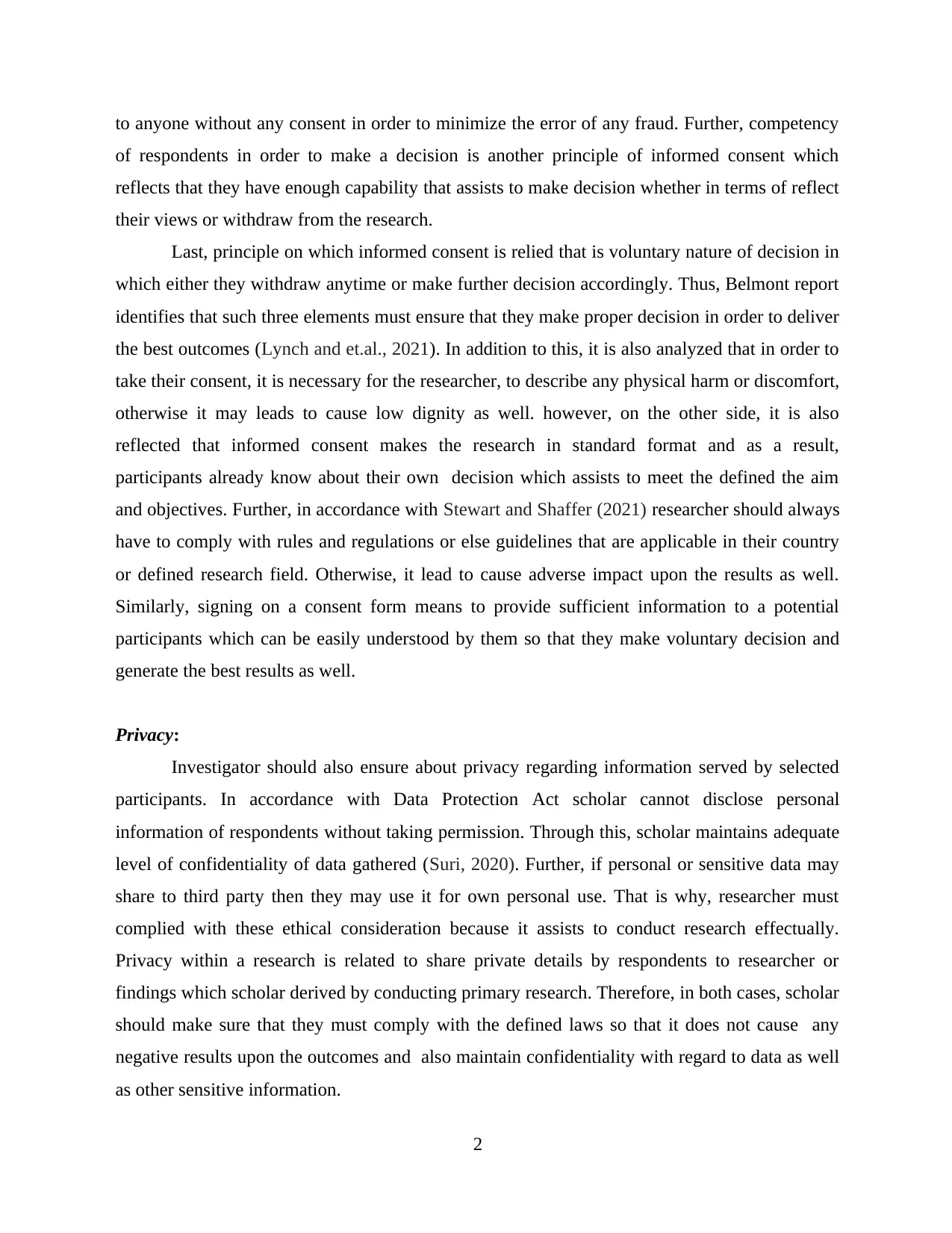
to anyone without any consent in order to minimize the error of any fraud. Further, competency
of respondents in order to make a decision is another principle of informed consent which
reflects that they have enough capability that assists to make decision whether in terms of reflect
their views or withdraw from the research.
Last, principle on which informed consent is relied that is voluntary nature of decision in
which either they withdraw anytime or make further decision accordingly. Thus, Belmont report
identifies that such three elements must ensure that they make proper decision in order to deliver
the best outcomes (Lynch and et.al., 2021). In addition to this, it is also analyzed that in order to
take their consent, it is necessary for the researcher, to describe any physical harm or discomfort,
otherwise it may leads to cause low dignity as well. however, on the other side, it is also
reflected that informed consent makes the research in standard format and as a result,
participants already know about their own decision which assists to meet the defined the aim
and objectives. Further, in accordance with Stewart and Shaffer (2021) researcher should always
have to comply with rules and regulations or else guidelines that are applicable in their country
or defined research field. Otherwise, it lead to cause adverse impact upon the results as well.
Similarly, signing on a consent form means to provide sufficient information to a potential
participants which can be easily understood by them so that they make voluntary decision and
generate the best results as well.
Privacy:
Investigator should also ensure about privacy regarding information served by selected
participants. In accordance with Data Protection Act scholar cannot disclose personal
information of respondents without taking permission. Through this, scholar maintains adequate
level of confidentiality of data gathered (Suri, 2020). Further, if personal or sensitive data may
share to third party then they may use it for own personal use. That is why, researcher must
complied with these ethical consideration because it assists to conduct research effectually.
Privacy within a research is related to share private details by respondents to researcher or
findings which scholar derived by conducting primary research. Therefore, in both cases, scholar
should make sure that they must comply with the defined laws so that it does not cause any
negative results upon the outcomes and also maintain confidentiality with regard to data as well
as other sensitive information.
2
of respondents in order to make a decision is another principle of informed consent which
reflects that they have enough capability that assists to make decision whether in terms of reflect
their views or withdraw from the research.
Last, principle on which informed consent is relied that is voluntary nature of decision in
which either they withdraw anytime or make further decision accordingly. Thus, Belmont report
identifies that such three elements must ensure that they make proper decision in order to deliver
the best outcomes (Lynch and et.al., 2021). In addition to this, it is also analyzed that in order to
take their consent, it is necessary for the researcher, to describe any physical harm or discomfort,
otherwise it may leads to cause low dignity as well. however, on the other side, it is also
reflected that informed consent makes the research in standard format and as a result,
participants already know about their own decision which assists to meet the defined the aim
and objectives. Further, in accordance with Stewart and Shaffer (2021) researcher should always
have to comply with rules and regulations or else guidelines that are applicable in their country
or defined research field. Otherwise, it lead to cause adverse impact upon the results as well.
Similarly, signing on a consent form means to provide sufficient information to a potential
participants which can be easily understood by them so that they make voluntary decision and
generate the best results as well.
Privacy:
Investigator should also ensure about privacy regarding information served by selected
participants. In accordance with Data Protection Act scholar cannot disclose personal
information of respondents without taking permission. Through this, scholar maintains adequate
level of confidentiality of data gathered (Suri, 2020). Further, if personal or sensitive data may
share to third party then they may use it for own personal use. That is why, researcher must
complied with these ethical consideration because it assists to conduct research effectually.
Privacy within a research is related to share private details by respondents to researcher or
findings which scholar derived by conducting primary research. Therefore, in both cases, scholar
should make sure that they must comply with the defined laws so that it does not cause any
negative results upon the outcomes and also maintain confidentiality with regard to data as well
as other sensitive information.
2
Paraphrase This Document
Need a fresh take? Get an instant paraphrase of this document with our AI Paraphraser
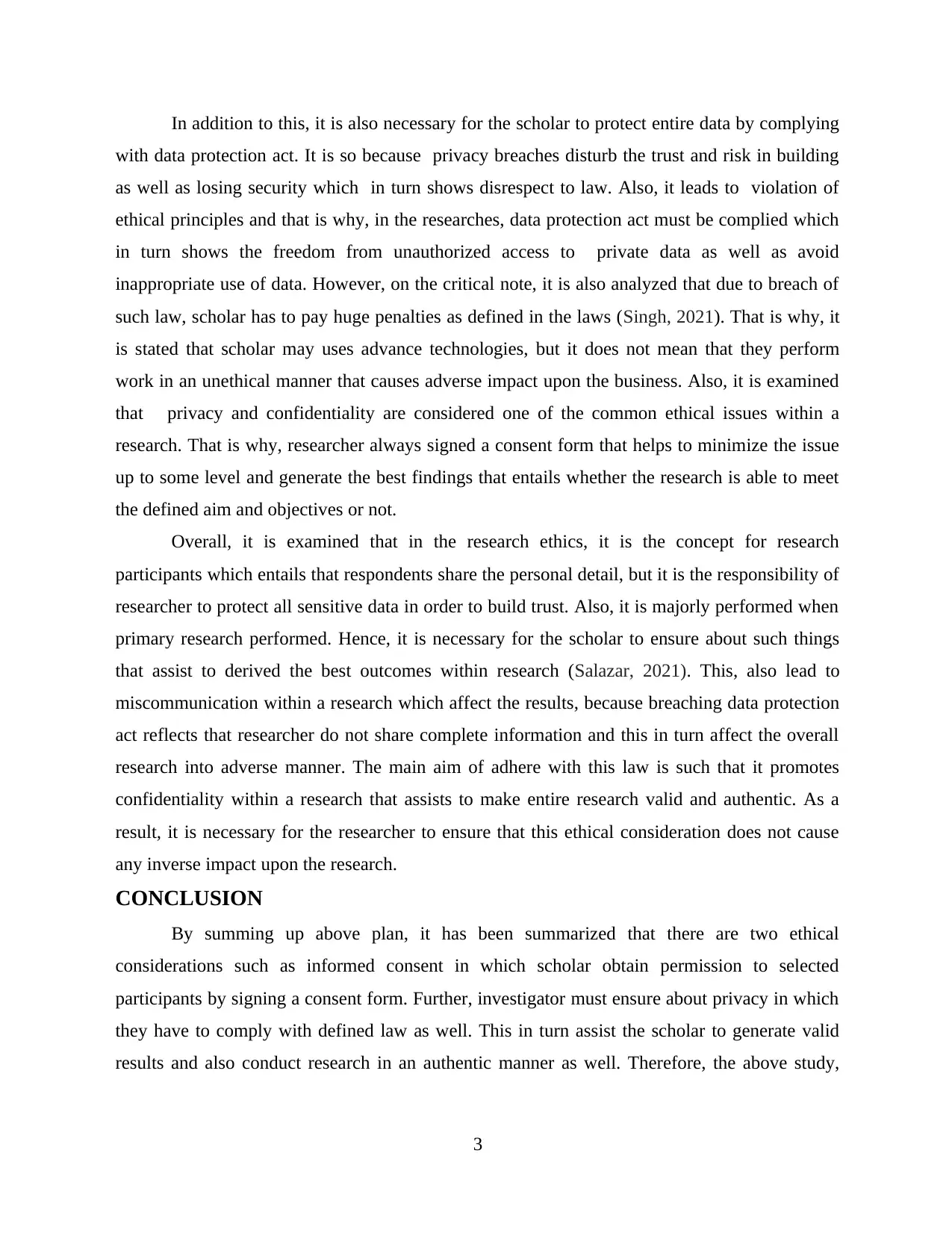
In addition to this, it is also necessary for the scholar to protect entire data by complying
with data protection act. It is so because privacy breaches disturb the trust and risk in building
as well as losing security which in turn shows disrespect to law. Also, it leads to violation of
ethical principles and that is why, in the researches, data protection act must be complied which
in turn shows the freedom from unauthorized access to private data as well as avoid
inappropriate use of data. However, on the critical note, it is also analyzed that due to breach of
such law, scholar has to pay huge penalties as defined in the laws (Singh, 2021). That is why, it
is stated that scholar may uses advance technologies, but it does not mean that they perform
work in an unethical manner that causes adverse impact upon the business. Also, it is examined
that privacy and confidentiality are considered one of the common ethical issues within a
research. That is why, researcher always signed a consent form that helps to minimize the issue
up to some level and generate the best findings that entails whether the research is able to meet
the defined aim and objectives or not.
Overall, it is examined that in the research ethics, it is the concept for research
participants which entails that respondents share the personal detail, but it is the responsibility of
researcher to protect all sensitive data in order to build trust. Also, it is majorly performed when
primary research performed. Hence, it is necessary for the scholar to ensure about such things
that assist to derived the best outcomes within research (Salazar, 2021). This, also lead to
miscommunication within a research which affect the results, because breaching data protection
act reflects that researcher do not share complete information and this in turn affect the overall
research into adverse manner. The main aim of adhere with this law is such that it promotes
confidentiality within a research that assists to make entire research valid and authentic. As a
result, it is necessary for the researcher to ensure that this ethical consideration does not cause
any inverse impact upon the research.
CONCLUSION
By summing up above plan, it has been summarized that there are two ethical
considerations such as informed consent in which scholar obtain permission to selected
participants by signing a consent form. Further, investigator must ensure about privacy in which
they have to comply with defined law as well. This in turn assist the scholar to generate valid
results and also conduct research in an authentic manner as well. Therefore, the above study,
3
with data protection act. It is so because privacy breaches disturb the trust and risk in building
as well as losing security which in turn shows disrespect to law. Also, it leads to violation of
ethical principles and that is why, in the researches, data protection act must be complied which
in turn shows the freedom from unauthorized access to private data as well as avoid
inappropriate use of data. However, on the critical note, it is also analyzed that due to breach of
such law, scholar has to pay huge penalties as defined in the laws (Singh, 2021). That is why, it
is stated that scholar may uses advance technologies, but it does not mean that they perform
work in an unethical manner that causes adverse impact upon the business. Also, it is examined
that privacy and confidentiality are considered one of the common ethical issues within a
research. That is why, researcher always signed a consent form that helps to minimize the issue
up to some level and generate the best findings that entails whether the research is able to meet
the defined aim and objectives or not.
Overall, it is examined that in the research ethics, it is the concept for research
participants which entails that respondents share the personal detail, but it is the responsibility of
researcher to protect all sensitive data in order to build trust. Also, it is majorly performed when
primary research performed. Hence, it is necessary for the scholar to ensure about such things
that assist to derived the best outcomes within research (Salazar, 2021). This, also lead to
miscommunication within a research which affect the results, because breaching data protection
act reflects that researcher do not share complete information and this in turn affect the overall
research into adverse manner. The main aim of adhere with this law is such that it promotes
confidentiality within a research that assists to make entire research valid and authentic. As a
result, it is necessary for the researcher to ensure that this ethical consideration does not cause
any inverse impact upon the research.
CONCLUSION
By summing up above plan, it has been summarized that there are two ethical
considerations such as informed consent in which scholar obtain permission to selected
participants by signing a consent form. Further, investigator must ensure about privacy in which
they have to comply with defined law as well. This in turn assist the scholar to generate valid
results and also conduct research in an authentic manner as well. Therefore, the above study,
3

concluded that there is a need to focused upon ethical considerations and to conduct a research
in better manner, it is necessary to comply with such laws as well.
4
in better manner, it is necessary to comply with such laws as well.
4
⊘ This is a preview!⊘
Do you want full access?
Subscribe today to unlock all pages.

Trusted by 1+ million students worldwide
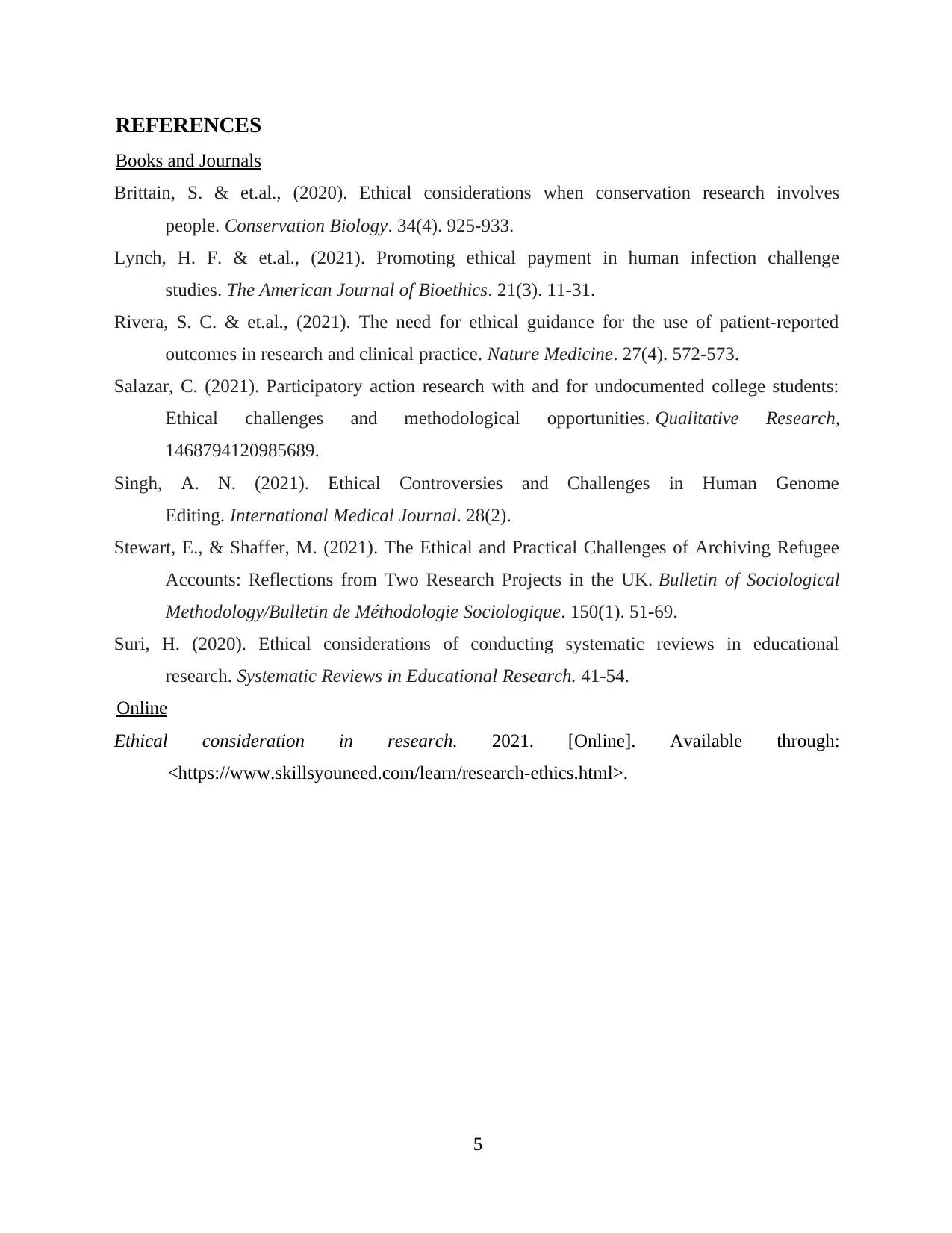
REFERENCES
Books and Journals
Brittain, S. & et.al., (2020). Ethical considerations when conservation research involves
people. Conservation Biology. 34(4). 925-933.
Lynch, H. F. & et.al., (2021). Promoting ethical payment in human infection challenge
studies. The American Journal of Bioethics. 21(3). 11-31.
Rivera, S. C. & et.al., (2021). The need for ethical guidance for the use of patient-reported
outcomes in research and clinical practice. Nature Medicine. 27(4). 572-573.
Salazar, C. (2021). Participatory action research with and for undocumented college students:
Ethical challenges and methodological opportunities. Qualitative Research,
1468794120985689.
Singh, A. N. (2021). Ethical Controversies and Challenges in Human Genome
Editing. International Medical Journal. 28(2).
Stewart, E., & Shaffer, M. (2021). The Ethical and Practical Challenges of Archiving Refugee
Accounts: Reflections from Two Research Projects in the UK. Bulletin of Sociological
Methodology/Bulletin de Méthodologie Sociologique. 150(1). 51-69.
Suri, H. (2020). Ethical considerations of conducting systematic reviews in educational
research. Systematic Reviews in Educational Research. 41-54.
Online
Ethical consideration in research. 2021. [Online]. Available through:
<https://www.skillsyouneed.com/learn/research-ethics.html>.
5
Books and Journals
Brittain, S. & et.al., (2020). Ethical considerations when conservation research involves
people. Conservation Biology. 34(4). 925-933.
Lynch, H. F. & et.al., (2021). Promoting ethical payment in human infection challenge
studies. The American Journal of Bioethics. 21(3). 11-31.
Rivera, S. C. & et.al., (2021). The need for ethical guidance for the use of patient-reported
outcomes in research and clinical practice. Nature Medicine. 27(4). 572-573.
Salazar, C. (2021). Participatory action research with and for undocumented college students:
Ethical challenges and methodological opportunities. Qualitative Research,
1468794120985689.
Singh, A. N. (2021). Ethical Controversies and Challenges in Human Genome
Editing. International Medical Journal. 28(2).
Stewart, E., & Shaffer, M. (2021). The Ethical and Practical Challenges of Archiving Refugee
Accounts: Reflections from Two Research Projects in the UK. Bulletin of Sociological
Methodology/Bulletin de Méthodologie Sociologique. 150(1). 51-69.
Suri, H. (2020). Ethical considerations of conducting systematic reviews in educational
research. Systematic Reviews in Educational Research. 41-54.
Online
Ethical consideration in research. 2021. [Online]. Available through:
<https://www.skillsyouneed.com/learn/research-ethics.html>.
5
1 out of 7
Related Documents
Your All-in-One AI-Powered Toolkit for Academic Success.
+13062052269
info@desklib.com
Available 24*7 on WhatsApp / Email
![[object Object]](/_next/static/media/star-bottom.7253800d.svg)
Unlock your academic potential
Copyright © 2020–2026 A2Z Services. All Rights Reserved. Developed and managed by ZUCOL.





